Progressive Men of Iowa
1899
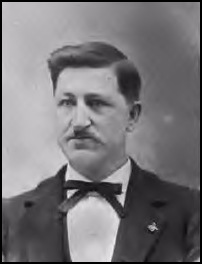 HALL, Lincoln Grant, of
Coggon, is of Scotch descent and is a distant
relative of ex-President Harrison. His father,
William Hall, is a prosperous farmer, who moved
to Iowa in 1869, from near Lima, Allen county,
Ohio, and located in Linn county. William Hall
enlisted as a soldier in the civil war and was
second lieutenant of Company B, One Hundred and
Fifty-first Ohio volunteers. William Hall's
father, Jacob R. Hall, served as a private in
the war of 1812, under General Harrison, who was
his cousin. Jacob R. Hall was a "Campbellite"
minister, a merchant and a farmer in Allen
county, Ohio. L. G.
Hall's mother was Mary E. Manner, and she was a
cousin of Col. A. V. Rice, of
Ottawa, Ohio. In her youth she attended a school
taught by Samuel J.
Kirkwood, war governor of Iowa, in
Richland county, Ohio. HALL, Lincoln Grant, of
Coggon, is of Scotch descent and is a distant
relative of ex-President Harrison. His father,
William Hall, is a prosperous farmer, who moved
to Iowa in 1869, from near Lima, Allen county,
Ohio, and located in Linn county. William Hall
enlisted as a soldier in the civil war and was
second lieutenant of Company B, One Hundred and
Fifty-first Ohio volunteers. William Hall's
father, Jacob R. Hall, served as a private in
the war of 1812, under General Harrison, who was
his cousin. Jacob R. Hall was a "Campbellite"
minister, a merchant and a farmer in Allen
county, Ohio. L. G.
Hall's mother was Mary E. Manner, and she was a
cousin of Col. A. V. Rice, of
Ottawa, Ohio. In her youth she attended a school
taught by Samuel J.
Kirkwood, war governor of Iowa, in
Richland county, Ohio.
On October 15, 1863,
Lincoln G. Hall was born. He went to the country
school in Jackson township, Linn county, known
as the Old South Prairie school, and taught by
Mrs. Elizabeth Blodgette, at present well known
as a prominent member of the Woman's Relief
corps. In 1881 and 1882 he attended the Marion
high school and in 1883 and 1884, Coe college at
Cedar Rapids. He then went to Chicago and took a
course in the Chicago College of Pharmacy. In
March, 1885, he entered the employ of J. H.
Davis, of Paris, Iowa, who was in the general
merchandise business. Here he remained for over
two years and had the advantage of a thorough
training in practical and successful business.
In October, 1887, he formed a partnership with
Dr. A. S.
Cunningham in the drug business at
Nugent's Grove, which is now known as Coggon. In
1888 Mr. Hall's father purchased the doctor's
interest in the business, which was continued
under the firm name of L. G. Hall
& Co. for one year, when he became sole
proprietor.
On November 23, 1887,
Mr. Hall was married to Inez E. Fleming. They
have two daughters, Hazel W. and Muriel M. Mr. Hall
and his wife joined the Jackson Congregational
church in 1890 and in 1897 transferred their
membership to the Zion Presbyterian church at
Coggon.
As an active republican Mr. Hall's
efficient services in the cause have been
recognized by his selection as chairman of the
township central committee for three years. He
has also been for several years a member of the
county central committee. For three years, from
1892 to 1895 he was a member of the council of
Coggon.
He was made a member of Level Lodge No.
284, A. F. and A. M., at Central City, in 1885,
exalted to Royal Arch degree in Marion Chapter
No. 10, Marion, in 1891; dubbed sir knight of
Apollo Commandery, Knights Templars No. 26, at
Cedar Rapids, in 1891, and was made a noble of
the Mystic Shrine in El Kahir Temple A. A. O. N.
M.
S., at Cedar Rapids.in 1891. He was a
member of D. Hedges Camp No. 68, Sons of
Veterans, at Central City, for three years, from
1885 to 1888; was captain of the company during
his connection with the order, and for faithful
service was presented with an elegant sword by
the members of above named camp. Served one year
as aid-de-camp on the staff of Gen. Walter S.
Payne.
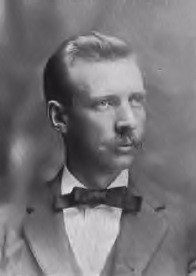 HARVEY,
Charles B., of Marion, Iowa, well known in that
region as secretary of the Y. M. C. A., is a
native of Illinois. His father, John F. Harvey,
is a farmer living near Aledo, 111., and was a
brave soldier in the war of the rebellion. He enlisted
in Company G, Thirtieth Illinois infantry, and
was in the third division of the seventeenth
army corps. He never missed an engagement that
his company was in; was never wounded and was
never in the hospital. After serving three years
and eleven months he was mustered out as a
sergeant. John F. Harvey's father, Beauchamp
Harvey, came to Illinois at an early date, and
was of English descent. He was a very
active member of the Christian church. HARVEY,
Charles B., of Marion, Iowa, well known in that
region as secretary of the Y. M. C. A., is a
native of Illinois. His father, John F. Harvey,
is a farmer living near Aledo, 111., and was a
brave soldier in the war of the rebellion. He enlisted
in Company G, Thirtieth Illinois infantry, and
was in the third division of the seventeenth
army corps. He never missed an engagement that
his company was in; was never wounded and was
never in the hospital. After serving three years
and eleven months he was mustered out as a
sergeant. John F. Harvey's father, Beauchamp
Harvey, came to Illinois at an early date, and
was of English descent. He was a very
active member of the Christian church.
Esther J. McClure, the
mother of Charles B., was a daughter of Capt.
John McClure, and was born near Attica, Ind.,
and when a little girl came west to Illinois
with her father's family. Most of that country
was then unsettled prairie and they came in
wagons. Her father was captain of Company G,
Thirtieth Illinois Veteran volunteers, and was
in the service about three years.
Charles B. Harvey was born
near Keithsburg, on July 9, 1870. He was rather
sickly when a child and attended school
irregularly. In 1888 he attended the city high
school and in 1889 the academy. He then began to
prepare for commercial life and entered the Iowa
Commercial college at Davenport. It was there he
first came in contact with the Young Men's
Christian association, although he had
previously joined the Presbyterian church, to
which his parents belonged. He found a higher
standard of spiritual life among the young men
who made up that association than he had found
in the country church. Before a year had passed
he felt a desire to take up the Y. M. C. A. work
for young men, but no way seemed open at the
time. In 1891 he
began work as bookkeeper for the Alpha nursery,
at Alpha, 111. November, 1893, he commenced work
for an uncle, Charles McClure, in his grocery
store at Keithsburg. While there he found an
opportunity to go into Y. M. C. A. work and in
October, 1894, became assistant secretary at
Davenport, Iowa. From here he went to Chicago to
the "Secretarial Training School" of the Y. M.
C. A. and in June, 1896, came to Marion as
secretary. He closed his
work in Marion, December 31, 1897, resigning to
accept a call to Sabbath school missionary work
in northwestern Minnesota, with headquarters at
Fergus Falls.
He was married December 29,
1897, to Miss Fannie Grace Veach, of Keithsburg,
ILL., at the Methodist parsonage, by Rev. W. H. Witter,
Keithsburg, ILL. Miss Veach was an active member
of the Methodist church, teacher in the Sabbath
school and a leading member of the Epworth
League. She was also
a member of the choir for about eight years, and
now aids her husband in his work
by the power of song. They have one
son, Louis Warden, born January 21,
1899.
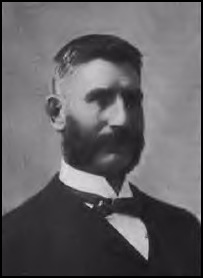 HATCH, Ezra Kidder, the
well-known banker of Central City, is a son of
Luther Hatch, one of the first residents of
Chicago, who located there in 1831, and who kept
an Indian trading post at Naperville before the
Black Hawk war. Mr. Hatch's ancestors were all
of English descent, who came from England and
settled in Massachusetts when it was an English
colony.
From there
the families removed to New Hampshire, where
they were prominent citizens and took an active
interest in public affairs. His grandfathers, on
both sides, held local town and county offices,
and were members of the New Hampshire
legislature. HATCH, Ezra Kidder, the
well-known banker of Central City, is a son of
Luther Hatch, one of the first residents of
Chicago, who located there in 1831, and who kept
an Indian trading post at Naperville before the
Black Hawk war. Mr. Hatch's ancestors were all
of English descent, who came from England and
settled in Massachusetts when it was an English
colony.
From there
the families removed to New Hampshire, where
they were prominent citizens and took an active
interest in public affairs. His grandfathers, on
both sides, held local town and county offices,
and were members of the New Hampshire
legislature.
Ezra was born in
Lisle, Du Page county, 111., February 3, 1841.
His father was a farmer during this period, and
the son attended the common schools of his
neighborhood, and received from them such
instruction as they afforded. When he reached
the age of 11 his father died, and at the age of
15 his mother married again and he had
henceforth to shift for himself. Soon
after this he came to Iowa and worked on a farm
in Jones county at $8 per month and board. When
farm work was slack in the winter he went to
school, and when about 17 he was able to teach
school himself. He then went to school at
Oberlin, Ohio, for one year and took a business
course. He continued working on a farm in summer
and teaching school in winter, saving his money
and investing it in land, until March, 1865,
when he married Lavonia D. Jordan and settled on
a farm of 160 acres. In 1868 he sold the farm
and stock for a little over $5,000, and went
into the mercantile business at Central City. In
1884 he started the Bank of Central City, with
which he is still connected. Mr. Hatch has been
closely identified with all enterprises for the
good of his town, and is a successful and
conservative business man. He is president of
the Central City Land and Improvement company,
and manager of the stock, grain and lumber
business. He has always been a republican, and
has held several local offices at various times.
He is a prominent Mason, and a member of the
Free Will Baptist
church.
They have five
children: Laura Marilla, born January 4. 1868;
Arabella Lavonia, born December 5,1869; Calista
Lydia, born October 19, 1871; Lester Orin, born
October 4,1878; and Ellen Jordan, born November
16, 1880.
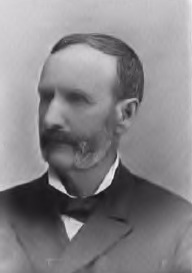 HUBBARD,
Nathaniel Mead, one of the most distinguished of
western railway lawyers, was born in Oswego, N.
Y., September 24, 1829, and was the son of a
Methodist preacher and farmer with a NewEngland
ancestry reaching back to 1624. The boyhood days
of Judge Hubbard were not spent in idleness, for
he battled with adverse conditions and conquered
them in his determination to obtain an education
and attain that station in life which his
intellectual powers qualified him to fill. His father
was Ansel Hubbard, who descended from George
Hubbard, of Middletown, Conn., who was born in
England in 1601 and settled in America in 1624.
Ansel Hubbard was married to Mary Mead, the
daughter of Nathaniel Mead, of New Jersey, and
Mary Buryl, a daughter of the first chancellor
of New Jersey. When Nathaniel was 7 years of age
the family removed to Troopsburg, Steuben
county, N. Y., and lived there until the death
of Ansel Hubbard. HUBBARD,
Nathaniel Mead, one of the most distinguished of
western railway lawyers, was born in Oswego, N.
Y., September 24, 1829, and was the son of a
Methodist preacher and farmer with a NewEngland
ancestry reaching back to 1624. The boyhood days
of Judge Hubbard were not spent in idleness, for
he battled with adverse conditions and conquered
them in his determination to obtain an education
and attain that station in life which his
intellectual powers qualified him to fill. His father
was Ansel Hubbard, who descended from George
Hubbard, of Middletown, Conn., who was born in
England in 1601 and settled in America in 1624.
Ansel Hubbard was married to Mary Mead, the
daughter of Nathaniel Mead, of New Jersey, and
Mary Buryl, a daughter of the first chancellor
of New Jersey. When Nathaniel was 7 years of age
the family removed to Troopsburg, Steuben
county, N. Y., and lived there until the death
of Ansel Hubbard.
An elder sister was the
first tutor of Nathaniel Hubbard, when he was a
hard-worked boy on the farm. By the aid of a
pine knot in the evenings, after his regular
work was done, he began his earnest efforts to
educate himself. After he had progressed far
enough, he taught school and carried on his
studies out of school hours. After he was 20
years old, he went to Alfred university, a
Seventh Day Baptist college in Alfred, N. Y.,
which has, for more than half a century,
welcomed the poor but earnest student. From this
institution young Hubbard was graduated in 1853.
He studied law in Hornellsville, N. Y., and came
west next year, locating in Marion, Iowa, April
14, 1854. Just before he left New York he was
married to Mary Wise. Mr. Hubbard continued the
practice of law in Marion until the civil war
broke out, when he early entered the service of
his country and served about three years.
Though he never boasts of
his army record, Judge Hubbard has seen much
more service than the average soldier and is far
more deserving of military distinction than many
who have more to say about what they have done.
He simply did his duty, and is satisfied with
that. He raised a company in Linn county and
entered the service as its captain, August 25,
1862. He served as captain of Company F,
Twentieth Iowa Volunteer infantry, in General
Herron 's division of the army of the frontier,
until March, 1863, when he was promoted to be
provost marshal and judge advocate of the army
of the frontier, on the staff of General Herron.
He was transferred to the Thirteenth Army corps,
Major-General Ord commanding, June 2, 1863, and
went to Brownsville, Texas, as judge advocate
and provost marshal of the Thirteenth Army
corps. He resigned for disability and his
resignation was accepted April 20, 1865. He was
breveted major for faithful and meritorious
services, March 16, 1867. Judge Hubbard is a
member of the Loyal Legion and is president of
the Society of the Army of the Frontier. Some of the
most inspiring patriotic addresses ever given in
the state have come from his pen, among them a
tribute to the flag, which has been recommended
by the state superintendent of public
instruction for use in the public schools.
Mr. Hubbard was appointed
district judge, November 15,1865, to fill a
vacancy, and served one year, when he was
succeeded by James H. Rothrock. Judge Hubbard
left the bench to enter the legal department of
the Chicago & Northwestern Railway company,
and has been in that company's service ever
since, most of the time as its Iowa attorney. He
removed to Cedar Rapids in 1870, and lives there
now. No man has
acquired more complete knowledge of the state of
Iowa than Judge Hubbard. It has been a part of
his duty to know and measure the importance of
all the elements and influences that could
affect the great property he represents in this
state, and the errors of judgment he has made in
law or in the discharge of other duties, have
been very few indeed. His keen and far-seeing
insight into the motives and purposes of men
have been of the greatest value to the important
interests entrusted to his care. He has been
more than successful. In the important
litigation in which the Northwestern has been
sometimes engaged, Judge Hubbard's plan of
conducting it, when differing from that of other
distinguished lawyers, has on several occasions
proved to be the correct one; notably in the
long and short haul cases several years ago.
Along with his professional
duties, which have not been confined to railway
business alone, Judge Hubbard has found time to
contribute of his time and brain to political
discussions and addresses on current topics, as
well as some literary work of a high order.
Whatever appears with his name attached is
eagerly read in Iowa because the people have
learned that they will find it full of ideas,
presented with telling force and in clear cut,
direct language. He has always been in demand as
a speaker on national holidays and other public
occasions. Having always been an earnest
republican, Judge Hubbard has taken a more or
less active part in every campaign, since he has
lived in Iowa, and in 1896 made a good many
strong sound money speeches.
Of his first marriage were
born twin daughters, Jessie and Jennie, in
1856. Jessie was
married in 1878 to George K. Barton, of Cedar
Rapids, and died in 1894. Jennie was married in
1877 to John W. Nye, and died
in 1882, leaving two children, Hubbard Nye and
Mary Nye. Judge Hubbard's first wife, Mary Wise
Hubbard, died in 1857, and in 1859 he was
married to Katherine Hervey, daughter of James
K. and Mary W.
Hervey, in Marion, Iowa. Of this marriage was
born, February 14, 1860, Nathaniel M. Hubbard,
Jr.
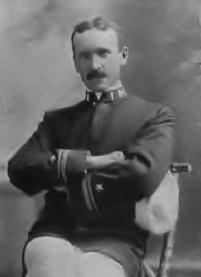 HUBBARD,
Nathaniel Mead, Jr., son of Judge N. M. Hubbard,
of Cedar Rapids, was born in Marion, Iowa,
February 14,1860. His ancestry is spoken of in
the sketch of his father, in this work. One of his
mother's ancestors, Rev. James Kieth, was pastor
of the first church in Bridgewater and settled
in Massachusetts in 1632. HUBBARD,
Nathaniel Mead, Jr., son of Judge N. M. Hubbard,
of Cedar Rapids, was born in Marion, Iowa,
February 14,1860. His ancestry is spoken of in
the sketch of his father, in this work. One of his
mother's ancestors, Rev. James Kieth, was pastor
of the first church in Bridgewater and settled
in Massachusetts in 1632.
In his boyhood and youth
Mr. Hubbard enjoyed the excellent educational
advantages of Cedar Rapids, and in 1877 entered
the United States Naval academy at Annapolis and
was graduated in 1882. After graduation he
served three years abroad, first on the United
States ship Yantic, in the North Atlantic
squadron, and then on the United States ship
Juniata, in European and Asiatic waters. He
resigned from the navy in 1885, attended
Columbia Law school and was admitted to practice
law in Iowa in 1887. He was then admitted to his
father's law firm, Hubbard, Clark & Dawley,
composed of the two Hubbards, Col. Charles A.
Clark and Frank F. Dawley. Colonel Clark retired
from the firm a few years later, and it was
known as Hubbard, Dawley & Hubbard, and now,
by the admission of Charles E. Wheeler, as
Hubbard, Dawley & Wheeler. Mr. Hubbard
was one of the organizers of the Royal Union
Mutual Life Insurance company, of Iowa, and has
been a director and the general attorney of that
company since its organization.
In 1889 Mr. Hubbard went to
Omaha and became the attorney for the Chicago,
St. Paul,
Minneapolis & Omaha Railway company, in
Nebraska. He returned to Cedar Rapids in 1894
and has resided there since. The firm is
one of the best known in the west, being engaged
in important litigation besides its railway
business, and enjoying a large consulting
clientage. N. M. Hubbard, Jr., has long taken a
considerable and growing share in the important
work of the firm, relieving his father of many
responsibilities and duties and performing them
all with credit to the name he bears. Having
inherited his father's peculiar ability and
great energy, with a resourceful and well
trained mind, he has already an established
position at the bar as one of the most
successful in Iowa.
When Spain declared war on
the United States, Mr. Hubbard remembered his
duty to the navy, which had given him such
valuable training, and he immediately re-entered
the service, May 5, 1898, with the commission of
an ensign. He was promoted to be lieutenant,
July 17, 1898, and was honorably discharged
November 19, 1898. During the war he served all
the time in the fleet before Santiago, having
been attached to the United States ship Justin,
and United States battleship Oregon, and took
part in the bombardment and blockade of
Santiago. At the close of the war, Lieutenant
Hubbard was second in command of the
double-turreted monitor Miantonomoh, and
remained with her until she was taken to the
League Island navy yard, Philadelphia, for
repairs, and put out of commission. He belongs
to the Loyal Legion, the Naval and Military
Order of the Spanish-American war, the
Association of United States Naval Graduates,
the United States Naval institute, and the Army
and Navy club, of Washington, D. C. Mr. Hubbard
was married December 24, 1889, to Miss Harriet
Howard, daughter of the late Hiram Howard, of
Faribault, Minn.
The information
on Trails to the Past © Copyright
may be used in personal family history research,
with source citation. The pages in entirety may
not be duplicated for publication in any fashion
without the permission of the owner. Commercial
use of any material on this site is not
permitted. Please respect the wishes of
those who have contributed their time and
efforts to make this free site possible.~Thank
you! | |
|
|
| |
|